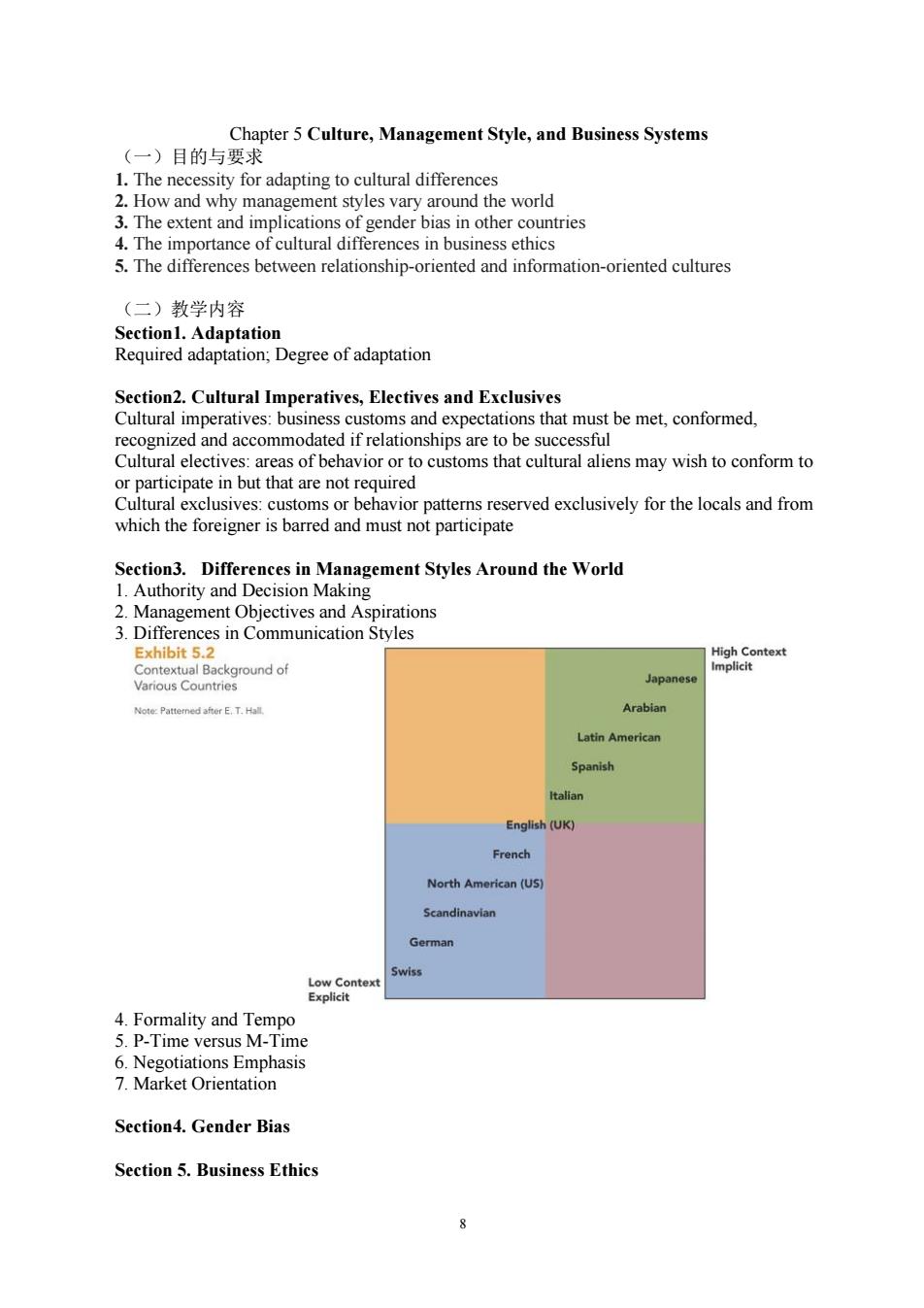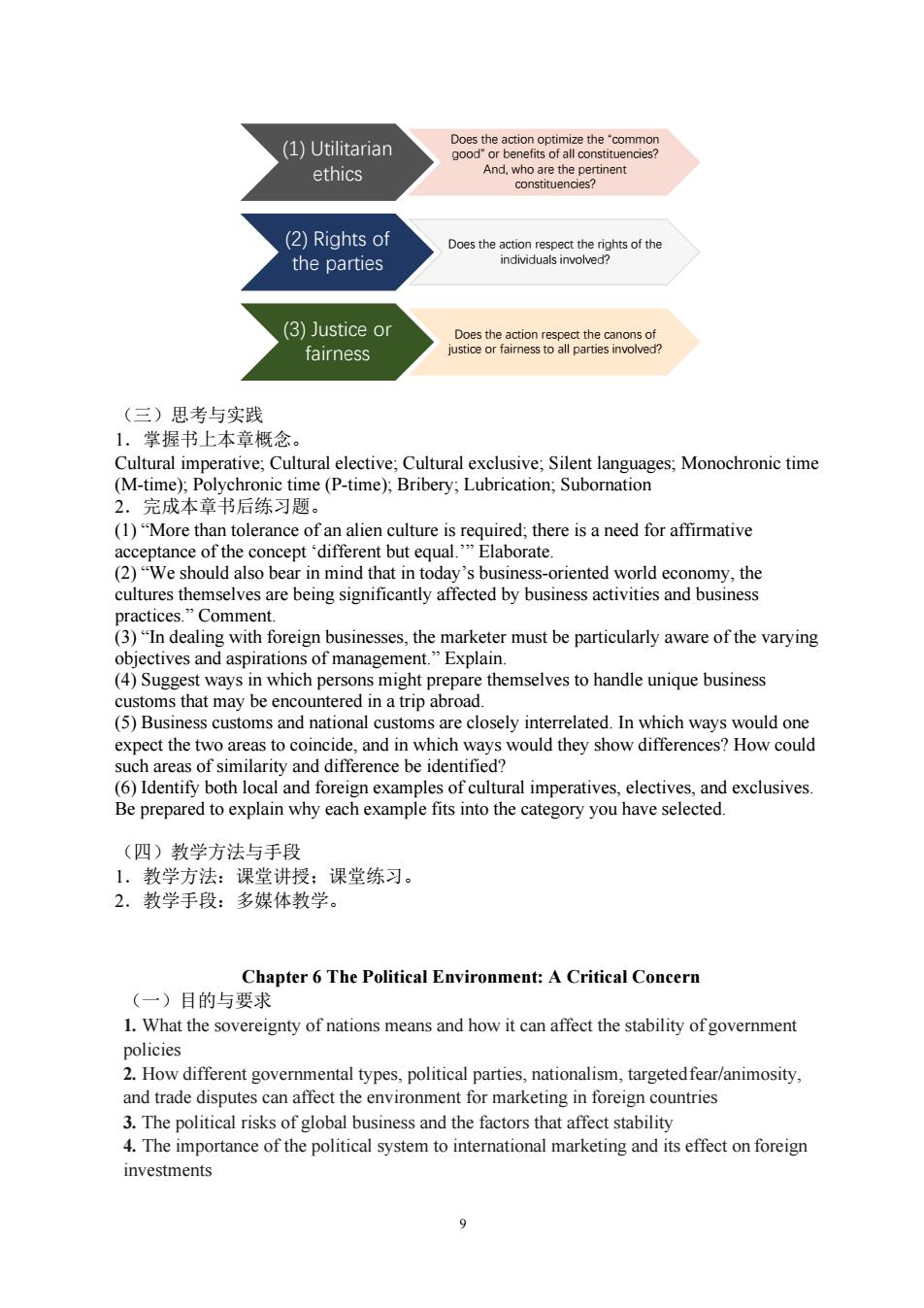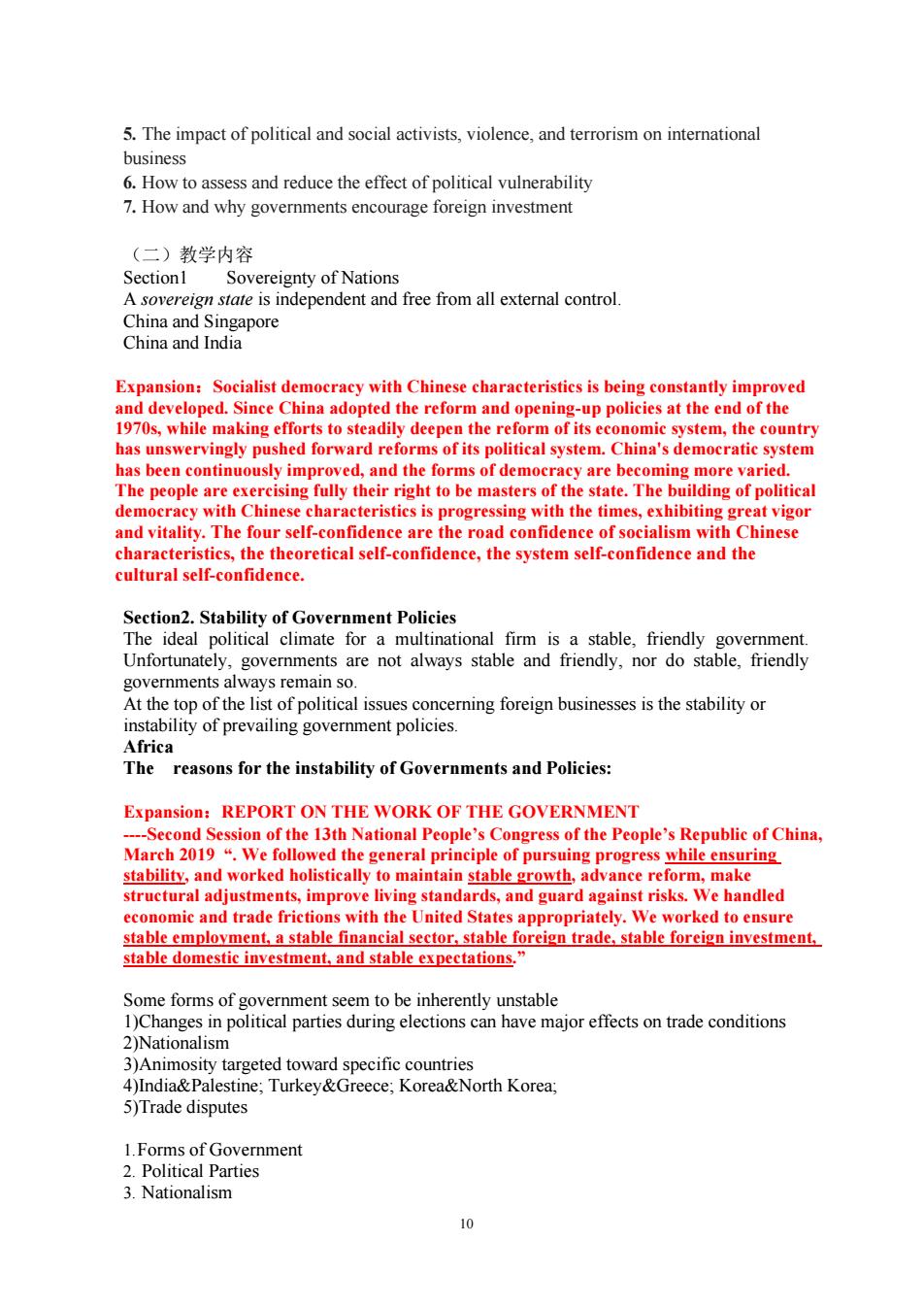
Consumption of different types of food influences culture Chocolate by Swiss,seafood by Japanese preference,beef by British,wines by France and Italy,Even diseases are influenced by culture stomach cancer in Japan,and lung cancer in Spain Exhibit 4. Patterns of Consumption(annual per capita) Cut Fish and Dried Flowers Chocolate Seafood Pasta Country (stems (kg kg) Wine(S) Tobacco(S] France 39 254 203 370 Germany 20 78 128 8. 130 Kingdom 48 105 9 15 1 3B4 5 194 United States 75 5.0 43 3.1 84 305 Expansion:The excellent traditional Chinese culture has an important contribution to the la be t th of the world hu ns'develo characters to var orms of arts bloor g.from the Four Grea t Inventions to the imperial examination system from the Silk Zh g He xpedition to the Wes later. s not only the un n of China.but also the re ntation of ce Western civilizations.The excellent traditional chinese culture has left a great length and thic and heavy col ur aces in the history of mankind,it is the common esteem that all mankind oy. asset th and publis oni ions are conv ed to state leaders th ouh the media and other information channels,both directly and indirectly influencing decisions on foreign policy.The traditional tha of the people are harmony,benevolence, Discussion:Why there are no Starbucks in Italy? Section3.Culture's Social Institutions ding family,religion,school,the media,government,and Expansion:In traditional Chinese culture,religion plays a very important role in China Confucianism.Taoism and Buddhism were together discussed in the period of Wu Emperor in North Zhou Dynasty,till now Confucianism has got a stable status,Taoism gradually rises,Buddhism advocates Tianzhu,discuss from difficulty gradually to harmony.The three thoughts are different,but the cores are the same,they all make people tend to kindness with slightly difference,but without affecting the whole. Chinese religion emphasizes benevolence,kindness,and harmony,which is widely vergent fro Western religi 00 s destruction,or killing infidels.And an rtant part of tradition oup be age g0p how societies define decency civility are interprete ith 。every culture
6 Consumption of different types of food influences culture Chocolate by Swiss, seafood by Japanese preference, beef by British, wines by France and Italy,Even diseases are influenced by culture stomach cancer in Japan, and lung cancer in Spain Expansion: The excellent traditional Chinese culture has an important contribution to the development of human beings. Since the Chinese history could be textually researched to the Ming and Qing Dynasties, the development history of China represents the most advanced level of the world humans' development from the gradual evolution of Chinese characters to various forms of arts blooming, from the Four Great Inventions to the imperial examination system, from the Silk Road to Zheng He's Expedition to the West later. The history displayes many examples that the great traditional Chinese culture have made great contributions to mankind. It is not only the unique creation of China, but also the representation of core spirit of Eastern and Western civilizations. The excellent traditional Chinese culture has left a great length and thick and heavy colour traces in the history of mankind, it is the common esteem that all mankind enjoy, and the invaluable asset that Chinese people take for pride. The cultural values of a country influence its national psychology and identity. Citizens’ values and public opinions are conveyed to state leaders through the media and other information channels, both directly and indirectly influencing decisions on foreign policy. The traditional cultural values that influence the psyche of the Chinese people are harmony, benevolence, righteousness, courtesy, wisdom, honesty, loyalty, and filial piety. Discussion: Why there are no Starbucks in Italy? Section3. Culture’s Social Institutions Social institutions including family, religion, school, the media, government, and corporations all affect culture Expansion: In traditional Chinese culture, religion plays a very important role in China, Confucianism, Taoism and Buddhism were together discussed in the period of Wu Emperor in North Zhou Dynasty, till now Confucianism has got a stable status, Taoism gradually rises, Buddhism advocates Tianzhu, discuss from difficulty gradually to harmony. The three thoughts are different, but the cores are the same, they all make people tend to kindness with slightly difference, but without affecting the whole. Chinese religion emphasizes benevolence, kindness, and harmony, which is widely divergent from Western religious thought of God’s destruction, or killing infidels. And this is also an important part of Chinese traditional culture. The family, social classes, group behavior, age groups, and how societies define decency and civility are interpreted differently within every culture

1.Family behavior varies across the world 2.Religious value systems differ across the world 3.Scl the Internet)influences ture and behavior nce the think zens eg the pem government c Section4.Culture's Social Institutions 1.Cultural Values 2.Rituals 3.Symbols 4 Beliefs 5.Thought Processes (三)思考与实践 1堂棍书上木音概令 Social institutions Cultural values Rituals sLinguistic distance Cultural sensitivity Cultural borrowing Cultural congruence Planned chang 2.完成本章书后练习题 What role doe es the marketer play as a change agent? (2)Discuss the three cultural ure Is pervasive in all ma changrmrketer can pursue. ng acti What is the importance of cultural empathy to foreign marketers?How do they acquire cultural empathy (5)Why should a foreign marketer be concerned with the study of culture? (6)"Members of a society borrow from other cultures to solve problems that they face in common."What does this mean?What is the significance to marketing? (7)"For the inexperienced marketer,the 'similar-but-different'aspect of culture creates an illusion of similarity that usually does not exist."Discuss and give examples. (8)Social institutions affect culture and marketing in a variety of ways.Discuss,giving examnles (9)"Markets are the result of the thre teraction of a marketer's efforts,economic conditions,and all other elements of the cultureComment. (10)What are som problems inforeig in?Discus (11) Defend proposition that a multin at nal corporation has no responsibility for the consequences of an innovation beyond the direct effects of the innovation,such as the product's safety.performance.and so forth. (四)教学方法与手段 1.教学方法:课堂讲授:课堂练习。 2.教学手段:多媒体教学
7 1. Family behavior varies across the world 2. Religious value systems differ across the world 3. School and education, and literacy rates 4. Media (magazines, TV, the Internet) influences culture and behavior 5. Government policies influence the thinking and behaviors citizens of adult citizens, e.g., the French government offers new “birth bonuses” of $800 given to women as an incentive to increase family size 6. Corporations influence culture via the products they market, e.g., MTV Section4. Culture’s Social Institutions 1. Cultural Values 2. Rituals 3. Symbols 4.Beliefs 5. Thought Processes (三)思考与实践 1. 掌握书上本章概念。 Social institutions Cultural values Rituals Linguistic distance Cultural sensitivity Cultural borrowing Cultural congruence Planned chang 2. 完成本章书后练习题。 (1) What role does the marketer play as a change agent? (2) Discuss the three cultural change strategies a foreign marketer can pursue. (3) “Culture is pervasive in all marketing activities.” Discuss. (4) What is the importance of cultural empathy to foreign marketers? How do they acquire cultural empathy? (5) Why should a foreign marketer be concerned with the study of culture? (6) “Members of a society borrow from other cultures to solve problems that they face in common.” What does this mean? What is the significance to marketing? (7) “For the inexperienced marketer, the ‘similar-but-different’ aspect of culture creates an illusion of similarity that usually does not exist.” Discuss and give examples. (8) Social institutions affect culture and marketing in a variety of ways. Discuss, giving examples. (9) “Markets are the result of the three-way interaction of a marketer’s efforts, economic conditions, and all other elements of the culture.” Comment. (10) What are some particularly troublesome problems caused by language in foreign marketing? Discuss. (11) Defend the proposition that a multinational corporation has no responsibility for the consequences of an innovation beyond the direct effects of the innovation, such as the product’s safety, performance, and so forth. (四)教学方法与手段 1. 教学方法:课堂讲授;课堂练习。 2. 教学手段:多媒体教学

Chapter 5 Culture,Management Style,and Business Systems (一)目的与要求 1.The necessity for adapting to cultural differences 2.How and why management styles vary around the world 3.The extent and implications of gender bias in other countries 4.The importance of cultural differences in business ethics 5.The differences between relationship-oriented and information-oriented cultures (二)教学内容 Section1.Adaptation Required adaptation;Degree of adaptation Section2.Cultural Imperatives,Electives and Exclusives Cultural imperatives:busines custo ms and expectations that must be met,conformed, accommodated rela onships are to as of behavior or t are no rved exclusively for the locals and from eris barred and must not participate Section3.Differences in Management Styles Around the World 1.Authority and Decision Making 2.Management Objectives and Aspirations 3.Differences in Communication Styles Exhibit 5. Wescagoundof Note:Pattered aftor E.T.Hall. Arabia Latin Americar Spanish taliar h(UK French North American(US Scandinavian German wis 4.Formality and Tempo 5.P-Time versus M-Time Section4.Gender Bias Section 5.Business Ethics
8 Chapter 5 Culture, Management Style, and Business Systems (一)目的与要求 1. The necessity for adapting to cultural differences 2. How and why management styles vary around the world 3. The extent and implications of gender bias in other countries 4. The importance of cultural differences in business ethics 5. The differences between relationship-oriented and information-oriented cultures (二)教学内容 Section1. Adaptation Required adaptation; Degree of adaptation Section2. Cultural Imperatives, Electives and Exclusives Cultural imperatives: business customs and expectations that must be met, conformed, recognized and accommodated if relationships are to be successful Cultural electives: areas of behavior or to customs that cultural aliens may wish to conform to or participate in but that are not required Cultural exclusives: customs or behavior patterns reserved exclusively for the locals and from which the foreigner is barred and must not participate Section3. Differences in Management Styles Around the World 1. Authority and Decision Making 2. Management Objectives and Aspirations 3. Differences in Communication Styles 4. Formality and Tempo 5. P-Time versus M-Time 6. Negotiations Emphasis 7. Market Orientation Section4. Gender Bias Section 5. Business Ethics

(1)Utilitarian ethics (2)Rights of Does the h the parties (3)Justice or fairness 0oeaemogi8ec (三)思考与实践 1.掌握书上本章概念 mperative: Cultural exclusi ind that but equ oriented world e % with foreign businesses,the marketer must be particularly aware of the varying objectives and aspirations of management"Explain (4)Suggest ways in which persons might prepare themselves to handle unique business customs that may be encountered in a trin abroad (5)Business customs and national customs are closely interrelated.In which ways would one expect the two areas to coincide,and in which ways would they show differences?How could such areas of similarity and difference be identified? (6)Identify both local and foreign examples of cultural imperatives,electives,and exclusives. Be prepared to explain why each example fits into the category you have selected. (四)教学方法与手段 1.教学方法:课堂讲授:课堂练习。 2.教学手段:多媒体教学。 Chapter 6 The Political Environment:A Critical Concern (一)目的与要求 1.What the sovereignty of nations means and how it can affect the stability ofgovernment atvpes licalparties and trade disputes can affect the environment for marketing in foreign countries 3.The political risks of global business and the factors that affect stability 4.The importance of the political system to international marketing and its effect on foreign investments 9
9 (三)思考与实践 1.掌握书上本章概念。 Cultural imperative; Cultural elective; Cultural exclusive; Silent languages; Monochronic time (M-time); Polychronic time (P-time); Bribery; Lubrication; Subornation 2.完成本章书后练习题。 (1) “More than tolerance of an alien culture is required; there is a need for affirmative acceptance of the concept ‘different but equal.’” Elaborate. (2) “We should also bear in mind that in today’s business-oriented world economy, the cultures themselves are being significantly affected by business activities and business practices.” Comment. (3) “In dealing with foreign businesses, the marketer must be particularly aware of the varying objectives and aspirations of management.” Explain. (4) Suggest ways in which persons might prepare themselves to handle unique business customs that may be encountered in a trip abroad. (5) Business customs and national customs are closely interrelated. In which ways would one expect the two areas to coincide, and in which ways would they show differences? How could such areas of similarity and difference be identified? (6) Identify both local and foreign examples of cultural imperatives, electives, and exclusives. Be prepared to explain why each example fits into the category you have selected. (四)教学方法与手段 1.教学方法:课堂讲授;课堂练习。 2.教学手段:多媒体教学。 Chapter 6 The Political Environment: A Critical Concern (一)目的与要求 1. What the sovereignty of nations means and how it can affect the stability of government policies 2. How different governmental types, political parties, nationalism, targetedfear/animosity, and trade disputes can affect the environment for marketing in foreign countries 3. The political risks of global business and the factors that affect stability 4. The importance of the political system to international marketing and its effect on foreign investments (1) Utilitarian ethics Does the action optimize the “common good” or benefits of all constituencies? And, who are the pertinent constituencies? (2) Rights of the parties Does the action respect the rights of the individuals involved? (3) Justice or fairness Does the action respect the canons of justice or fairness to all parties involved?

5.The impact of political and social activists,violence,and terrorism on international business 6.How to assess and reduce the effect of political vulnerability 7.How and why governments encourage foreign investment (二)教学内容 Sectionl Sovereignty of Nations A sovereign state is independent and free from all external control. China and Singapore China and India Expansion:Socialist democracy with Chinese characteristics is being constantly improved e m ing ed fo 10s naem,h The p eople are exereising fully their right to be masters of the state.The building ofp democracy with Chinese characteristies is progressing with the times,exhibiting great vigor and vitality.The four self-confidence are the road confidence of socialism with Chinese characteristics,the theoretical self-confidence,the system self-confidence and the cultural self-confidence. on2.Stabi ent Policie mu a stable,friendl f th government olncering foreign businesses is the s Africa of prev The reasons for the instability of Governments and Policies: Expansion:REPORT ON THE WORK OF THE GOVERNMENT Second Session of the 13th National People's Congress of the People's Republic of China March 2019".We followed the general principle of pursuing progress while ensuring stability,and worked holistically to maintain stable growth,adva nce reform,make structural ad nents,improve ving standards,and guard agains trisks.We handled to ensure ent.and stable ex Some forms of government seem to be inherently unstable 1)Changes in political parties during elections can have major effects on trade conditions 2)Nationalism 3)Animosity targeted toward specific countries 4)India&Palestine;Turkey&Greece;Korea&North Korea, 5)Trade disputes 10
10 5. The impact of political and social activists, violence, and terrorism on international business 6. How to assess and reduce the effect of political vulnerability 7. How and why governments encourage foreign investment (二)教学内容 Section1 Sovereignty of Nations A sovereign state is independent and free from all external control. China and Singapore China and India Expansion:Socialist democracy with Chinese characteristics is being constantly improved and developed. Since China adopted the reform and opening-up policies at the end of the 1970s, while making efforts to steadily deepen the reform of its economic system, the country has unswervingly pushed forward reforms of its political system. China's democratic system has been continuously improved, and the forms of democracy are becoming more varied. The people are exercising fully their right to be masters of the state. The building of political democracy with Chinese characteristics is progressing with the times, exhibiting great vigor and vitality. The four self-confidence are the road confidence of socialism with Chinese characteristics, the theoretical self-confidence, the system self-confidence and the cultural self-confidence. Section2. Stability of Government Policies The ideal political climate for a multinational firm is a stable, friendly government. Unfortunately, governments are not always stable and friendly, nor do stable, friendly governments always remain so. At the top of the list of political issues concerning foreign businesses is the stability or instability of prevailing government policies. Africa The reasons for the instability of Governments and Policies: Expansion:REPORT ON THE WORK OF THE GOVERNMENT ----Second Session of the 13th National People’s Congress of the People’s Republic of China, March 2019 “. We followed the general principle of pursuing progress while ensuring stability, and worked holistically to maintain stable growth, advance reform, make structural adjustments, improve living standards, and guard against risks. We handled economic and trade frictions with the United States appropriately. We worked to ensure stable employment, a stable financial sector, stable foreign trade, stable foreign investment, stable domestic investment, and stable expectations.” Some forms of government seem to be inherently unstable 1)Changes in political parties during elections can have major effects on trade conditions 2)Nationalism 3)Animosity targeted toward specific countries 4)India&Palestine; Turkey&Greece; Korea&North Korea; 5)Trade disputes 1.Forms of Government 2. Political Parties 3. Nationalism